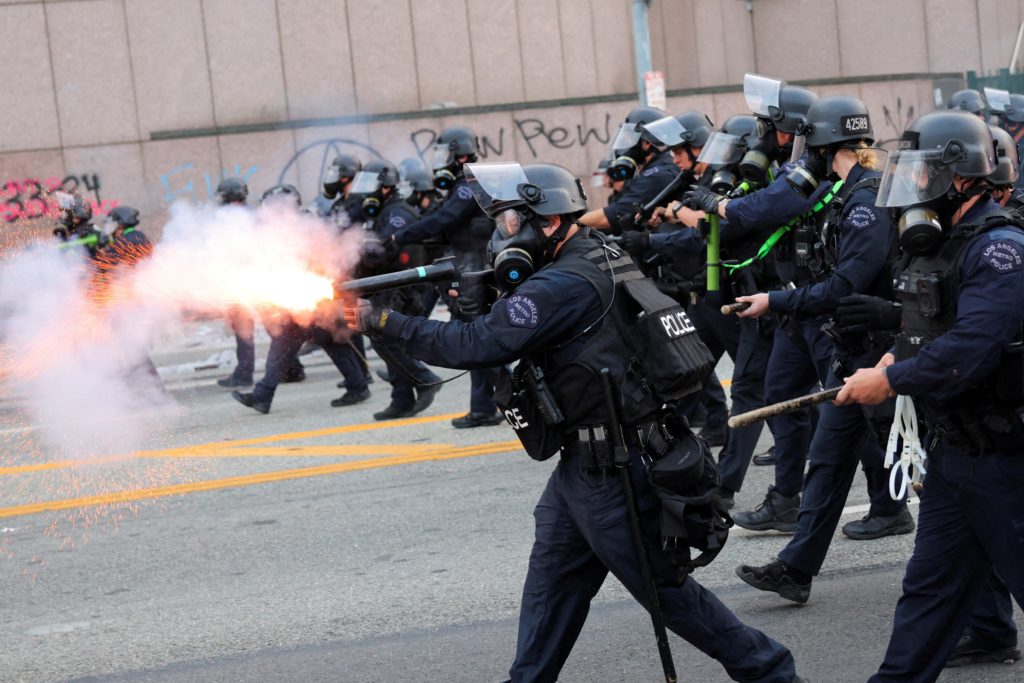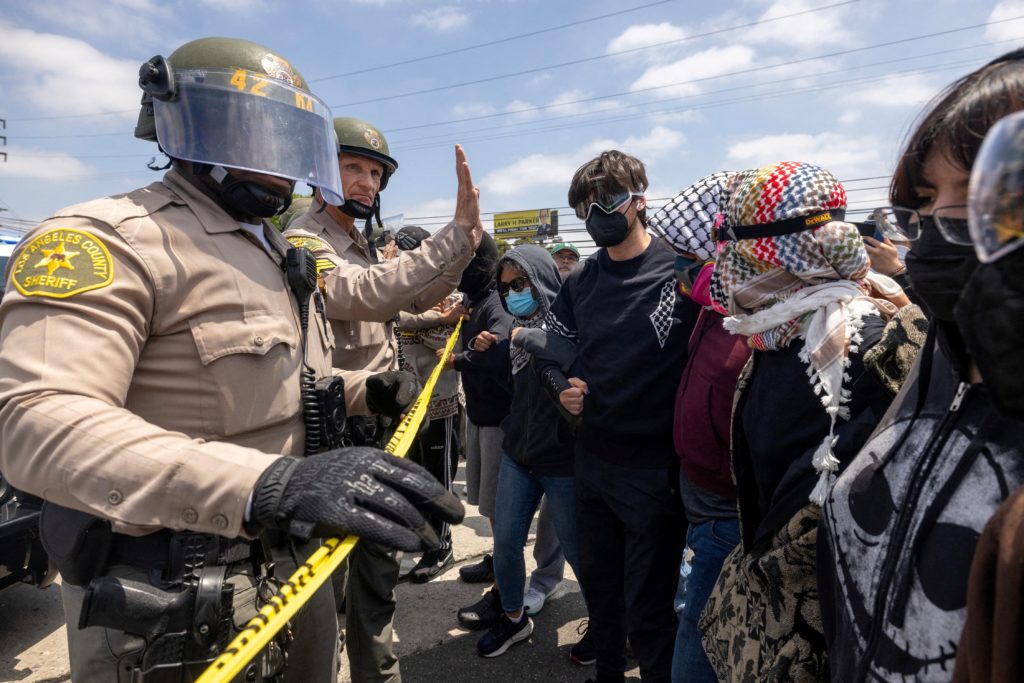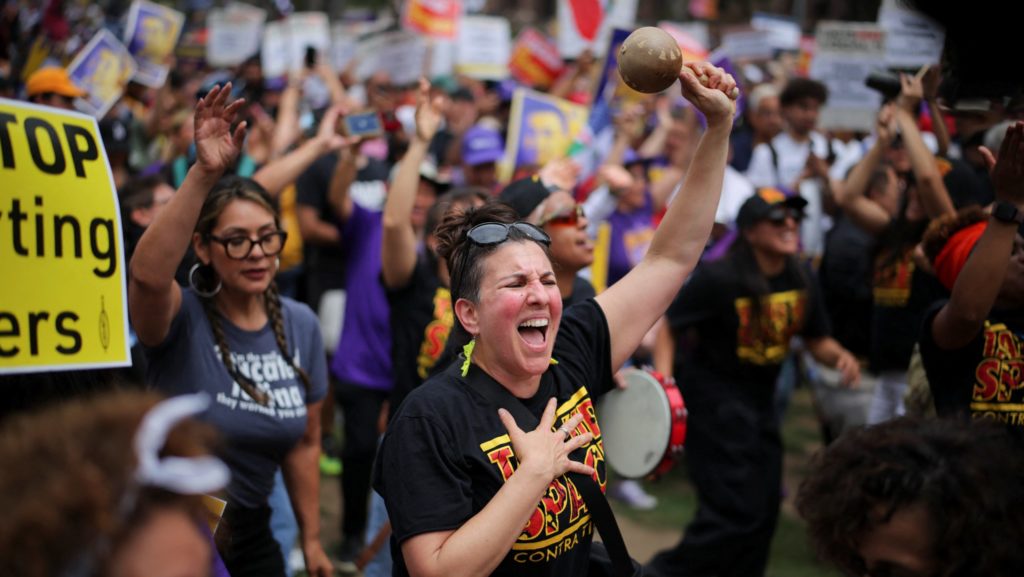Archbishop José H. Gomez of Los Angeles is calling for prayer, while urging "restraint and calm" as clashes have broken out in that city over recent immigration arrests. President Donald Trump has deployed the National Guard amid pushback from California officials and is threatening to mobilize Marines.
Protests broke out on June 6 after several raids by U.S. Immigration and Customs Enforcement, which along with Customs and Border Protection is the law enforcement arm of the Department of Homeland Security.
The raids -- part of Trump's promised crackdown on illegal immigration -- took place in predominantly Latino areas of Los Angeles, with demonstrations forming at the Federal Building in the city's downtown, on Highway 101 and in front of a Home Depot in Paramount, 20 miles south of the city's downtown. Several driverless taxis were set on fire, with dozens arrested and 60 taken into custody at related protests in San Francisco.
The Los Angeles Police Department responded to the protests, making close to 60 arrests over the June 7-8 weekend.
In a June 7 memorandum, Trump mobilized at least 2,000 National Guard troops to "temporarily protect ICE and other United States Government personnel who are performing Federal functions, including the enforcement of Federal law, and to protect Federal property, at locations where protests against these functions are occurring or are likely to occur based on current threat assessments and planned operations."

The troops are active "for 60 days or at the discretion of the Secretary of Defense," who in turn "may employ any other members of the regular Armed Forces as necessary to augment and support the protection of Federal functions and property in any number determined appropriate in his discretion," wrote Trump.
Invoking a law that allows for placing National Guard troops -- who operate under both federal and state authority -- under federal command, Trump said in his memo that "incidents and credible threats of continued violence" justified his measure.
The move drew the ire of both Los Angeles Mayor Karen Bass and California Gov. Gavin Newsom, with the latter demanding in a June 8 X post that Trump "rescind the order" and "return control to California."
Rarely does a president activate a state's National Guard troops without consulting the governor, although such an action is not unprecedented. In 1957, President Dwight D. Eisenhower federalized the Arkansas National Guard and deployed the 101st Airborne Division to Little Rock to enforce federal school desegregation, after Arkansas Gov. Orval Faubus defied school desegregation orders.
In his first term, Trump cooperated with several governors who at his request sent their National Guard troops to Washington in response to riots there over the murder of George Floyd.
On June 8, Newsom's office also sent a two-page letter to Defense Secretary Pete Hegseth, formally asking him to rescind the order as Los Angeles city and county law enforcement were "sufficient to maintain order."
Newsom confirmed to MSNBC June 9 he plans to sue Trump over the matter.
The standoff points to a larger rift between a number of state and local authorities and the Trump administration over the flashpoint issue of immigration, particularly in municipalities known as "sanctuary cities," where local law enforcement limits cooperation in federal immigration enforcement.

While the Los Angeles protests appeared to have leveled off on June 9, the Archdiocese of Los Angeles announced that Scholas USA -- part of a youth movement founded by the late Pope Francis -- postponed an event that was set to be hosted by a Catholic school.
"Our work is grounded in a commitment to dignity, justice, and respect for all -- especially immigrant communities who are facing profound challenges at this moment," said Scholas USA executive director Jimena Florez in a June 9 media release. "We believe it’s important to pause, listen, and stand in solidarity with those raising their voices for equity and compassion."
Archbishop Gomez, who said in his statement he was "troubled" by the immigration enforcement raids, pleaded for a more comprehensive solution to the nation's handling of immigration issues.
"We all agree that we don’t want undocumented immigrants who are known terrorists or violent criminals in our communities," said the archbishop. "But there is no need for the government to carry out enforcement actions in a way that provokes fear and anxiety among ordinary, hard-working immigrants and their families."
He urged Congress "to get serious about fixing our broken immigration system that leads so many to seek to cross our borders illegally."
"Other nations have a coherent immigration policy that respects the natural rights of people to emigrate in search of a better life and also ensures control of their borders. America should too," said Archbishop Gomez. "It’s been almost 40 years since the last reform of our immigration laws. That’s too long and it’s time to do something about that."
Catholic social teaching on immigration balances three interrelated principles -- the right of persons to migrate in order to sustain their lives and those of their families, the right of a country to regulate its borders and control immigration, and a nation's duty to regulate its borders with justice and mercy.
"May Our Lady of Guadalupe continue to watch over her children and pray for America," said Archbishop Gomez.

